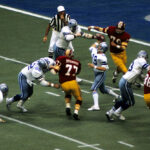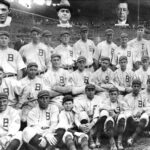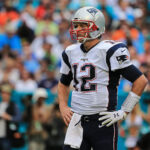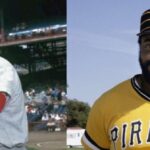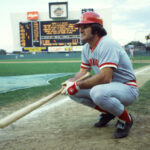Reaching for the Top: Novak Djokovic Looks For Repeat Down Under
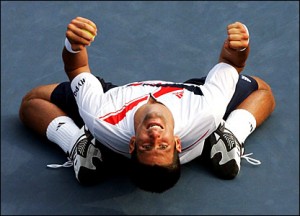
Novak Djokovic will look to return to the form that helped him win the 2008 Australian Open.
If winning isn’t everything, why do they keep score? ~Vince Lombardi
If you pay attention to the rhetoric emanating from the tennis world and note all the speculation about the upcoming “season”, you will hear endless debates about which player will survive the ATP or WTA 2010 scheduled obstacle course to wear the No. 1 mantle.
The irony is, of course, that even after a whole year of competition in 2009, when Roger Federer emerging with the No. 1 ranking, there is no consensus that he is the worthy recipient of that well-earned entitlement.
Consider Dinara Safina’s reign at No. 1, for example. Regardless of the stats pronouncing the unequivocal bottom line, the debate continues to rage about who is “the best”. Is it safe to assume that “No. 1” and “best” even equivalent terms?
Who should be No. 1 appears to be quite subjective. Is it a mark of greatness that you can hold the No. 1 ranking even if you have never won a “major”—like Dinara Safina, on the women’s side? Winning isn’t enough apparently—you have to win majors.
On the men’s side, there are few besides Federer and Rafael Nadal who have accomplished that. Then how many majors are enough to appease the perfectionists amongst us? What criteria should be examined to determine the designation of No. 1?
With that never ending controversy in mind, it would be a great exercise to list all of the multi-talented tennis players who should have been great—should have climbed to that No. 1 spot—but who never quite made it to the upper echelons. Their names are endless—talent not withstanding.
There are those who contend that it all comes down to self-confidence and the determination never to quit. Winners must keep up intensity until the opponent caves in under the pressure. The champion never considers losing because he or she is too busy figuring out how to win.
Foremost is the ability to concentrate and not let the opponent or the moment interfere with talent, ability, instincts and game plans.
Novak Djokovic
The first subject, Novak Djokovic, is on the boundary waters, ready to sink back into this almost made-it slough. Not many would argue that he has significant talent with the purest groundstrokes of any player at the top. His all-court game unifies his strengths, emphasizing an excellent serve, foot speed, and power.
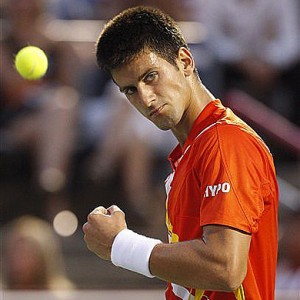
Djokovic didn't reach the semifinals in any grand slam tournament in 2009.
He moves easily from defense to offense and mixes up his approach with lobs and well-disguised drop shots. Djokovic exhibits soft hands at the net volleying, and his serve, which often hits hard and very flat, can also be a weapon sliced out wide. He is able to return serve with the best.
His only true weakness seems to be his stamina and his mental acumen. His physical limitations may very well be a reflection of his mental preparedness to go the distance.
What has set the Djoker apart from the others is that he has already done it—won a major. He has been to the summit and has seen what it looks like to be on top. In a remarkable 2008 run, Djokovic won the Australian Open, dismissing Federer in the semifinals and running over Jo Wilfried-Tsonga in the finals.
Novak Djokovic, the young man from Serbia, relished being the center of attention—seeking the spotlight and stirring up controversy. Proof evident—mime impersonations of his fellow tennis celebs, even when it was obvious they harbored resentment on being so mocked. Donning blue shoes—then red shoes.
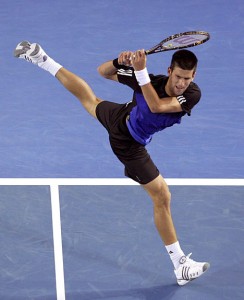
The 22-year-old Djokovic should be reaching his prime in 2010.
There is nothing wrong with having fun and enjoying the spotlight as long as you realize that people pay attention to you primarily because you play world class tennis. There is nothing wrong with establishing a style statement that defines who you are as long as you remember that who you are first of all is a tennis player.
The hardest part about playing tennis is winning. The other stuff comes pretty easily—the celebrity stuff. It only makes sense then that you make sure your priorities are in order and that winning tournaments is the first goal each and every day you plant your feet on the floor getting out of bed.
Granted Djokovic is young. He is still only 22-years-old. We tend to overlook that in light of our expectations of perfection in athletes. Djokovic won his first major when he was 20.
That is not remarkable—Nadal won his first major at age 19 and Borg won his first at age 18. But the sustained air of invincibility has not been evident in the Serb since 2008. When Djokovic takes the court, you sense his attitude and his doubt rise when stiff competition stands resolutely on the other side of the net.
During one of his last matches against Robin Soderling during the ATP World Tour Finals in London, the resignation was obvious. Soderling was playing spectacular tennis, serving lights out, hitting lines, and generally making life miserable for the young man from Serbia.
Soderling won the first set in a tie-break. But unlike Federer or unlike Nadal, who would have fought hard on every single point, never giving up the fight, Djokovic looked up at his box, shrugging at his own misses, and acquiesced—he gave up the fight and decided that today was not his day. He lost the second set, winning only one game.
That reaction is a death knell if you hope to be No. 1, and certainly Djokovic has let everyone know that this is his desire. He has stated that his lifelong dream is to ascend to the top of the men’s game from a very early age.
Obviously, it is not going to happen if doubt creeps into his corner. Players will lose because everyone does sooner or later—it is inevitable; but you never concede. That is what losers do.
As Djokovic begins 2010, he needs to find his invincibility cloak once again and practice wearing it all the time. The Serb has a perfect opportunity for a repeat at the 2010 Australian Open because he has done it before, and his belief must be at its strongest in Melbourne.
The time is right. The choice, however, is his. His talent will take him there—it has already. He needs to reign in his negativity and begin the long, arduous climb back to the top—starting down under.
